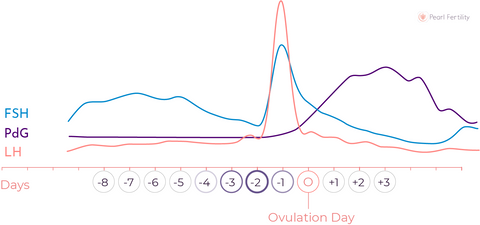Guest post by Ashley Faille, Pearl Fertility
Did you know your hormones control all functions, signs, and symptoms of your cycle? Estrogen, progesterone, FSH, and LH are some of the hormones that take part in regulating your cycle every month. Their levels are critical to keeping everything running correctly. Want to know what LH and FSH levels can tell you about your cycle and how to measure them? Keep reading to find out.
What are FSH and LH?
The follicle-stimulating hormone (FSH) and luteinizing hormone (LH) are two of the hormones that regulate your menstrual cycle each month. They are responsible for maturing the eggs in the ovaries (FSH) and ovulation (LH).
FSH stimulates the maturation of ovarian follicles and gets them ready for ovulation. A few follicles are activated every cycle, but only one matures completely and is prepared for ovulation. FSH levels rise during the first half of the menstrual cycle and are lowest after ovulation.
LH also controls the menstrual cycle and triggers ovulation. LH peaks around 12-24 hours before ovulation, which causes the follicle to release the egg from the ovaries to the Fallopian Tube. That process is called ovulation.
The rise and drops of hormones are what control the menstrual cycle. If levels or relationships between hormones are off, it can cause different symptoms such as acne, anxiety, weight gain, period problems, and even infertility.
Charting your menstrual cycle can be a great way of learning about your body and its changes. It can be a good way to monitor your health and to do family planning. Charting your hormones can give you more depth and insights as to what is happening every cycle.
How to Chart/Measure LH and FSH
- Home testing: Home hormone testing consists of testing hormones with urine strips. These strips change color according to the levels of hormones. By doing this daily, you can have a complete cycle chart. Pearl uses an app to translate the information from the strips into your own personalized chart. You can look at how your chart builds throughout your cycle directly on your smartphone.
- Blood tests: When taking a blood sample to determine the LH and FSH levels, it is essential to hit the right time during the cycle, depending on what you want to examine. Rarely the measurement of LH alone or FSH alone are sufficient to obtain an adequate statement in the context of fertility treatment (cycle monitoring) or for determining ovulation or both.
- Saliva tests: Testing hormones in saliva is another method to determine their concentration. It is a non-invasive and straightforward test that offers reliable results.

What Can My Hormone Levels Tell Me?
FSH levels
Low FSH values can indicate an under function of the pituitary gland or hypothalamus. Prolactin inhibits the release of FSH and LH. Increased prolactin levels can lead to very low FSH and LH values1. High prolactin levels can occur, for example, in certain pituitary tumors, an underactive thyroid gland, pregnancy, and breast-feeding2.
Underweight women can also have low FSH levels. In this case, FSH and LH production stops, and estrogen levels are, as a consequence, low. Often the period also fails to appear in such cases. It is usually sufficient to return to a normal weight to bring the levels back to a normal level.
A high FSH level can indicate a diminished ovarian reserve (DOR)3, which can cause infertility and indicate menopause4.
LH levels
When the pituitary gland itself is affected, it may not produce enough LH. If the upper hypothalamus cannot provide enough Gonadotropin-releasing hormone (GnRH), LH production will also cease. Low LH levels may mean you have a pituitary disorder, anorexia, malnutrition, or are under stress5. If no LH peak is detected, ovulation may not occur.
A possible cause of an elevated LH concentration can be polycystic ovarian syndrome – or PCOS. Women with PCOS often have elevated LH levels and low FSH levels, contributing to poor egg development and an inability to ovulate6.
If high LH and FSH levels are detected, the problem is almost certainly located in the ovaries. If the ovaries do not function and produce too few hormones (estrogen, progesterone), this is registered by the hypothalamus and the pituitary gland. As a result, they provide high levels of LH and FSH to stimulate the ovaries even more.
Do you track your hormones? Remember, it is time to stop guessing and wondering what is going on inside your body. You deserve answers!
If you would like to try Pearl to track your cycle, predict ovulation and know your most fertile days, we have a discount code. Get 10% off any purchase with the BELI10 code.
--
Ashley Faille is the head of social media for Pearl Fertility. She now works in marketing and has a background in healthcare. She is originally from Chile and now lives in Munich, Germany. Ashley loves baking, knitting, going to the beach and travelling in her free time.
This blog post is for informational purposes only and does not constitute medical advice, diagnosis, or treatment. Always seek your physician's advice or another qualified health provider with any questions regarding a medical condition.
- McNeilly A. S. (1980). Prolactin and the control of gonadotrophin secretion in the female. Journal of reproduction and fertility, 58(2), 537–549. https://doi.org/10.1530/jrf.0.0580537
- Prolactinoma - Symptoms and causes. (2020, May 28). Mayo Clinic. https://www.mayoclinic.org/diseases-conditions/prolactinoma/symptoms-causes/syc-20376958.
- Roudebush, W. E., Kivens, W. J., & Mattke, J. M. (2008). Biomarkers of Ovarian Reserve. Biomarker insights, 3, 259–268. https://doi.org/10.4137/bmi.s537
- How Do I Know I’m in Menopause? (2021). The North American Menopause Society, NAMS. https://www.menopause.org/for-women/menopauseflashes/menopause-symptoms-and-treatments/how-do-i-know-when-i'm-in-menopause-.
- Luteinizing Hormone (Blood) - Health Encyclopedia. (2020). University of Rochester Medical Center. https://www.urmc.rochester.edu/encyclopedia/content.aspx?ContentTypeID=167&ContentID=luteinizing_hormone_blood
- Causes of PCOS. (2015, December 11). Center for Research in Reproduction. https://med.virginia.edu/research-in-reproduction/patient-information/.


